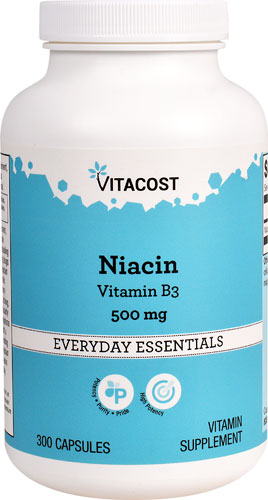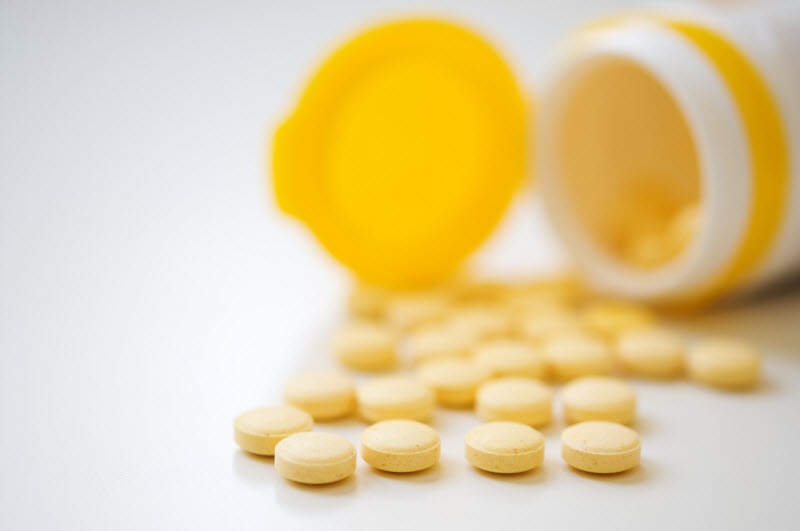Vitacost Niacin - Vitamin B-3 Description
Supports healthy lipid metabolism and circulation!*
What is Niacin - Vitamin B3?
Niacin (vitamin B-3) also known as nicotinic acid, is a member of the B family of vitamins and is found in the company of other B vitamins—vitamin B1 (thiamine), vitamin B2 (riboflavin), vitamin B5 (pantothenic acid), vitamin B6 (pyridoxine), vitamin B12 (cyanocabalamin) and folic acid.
Niacin is water soluble, meaning it’s not stored in the body and must be replaced daily. It can be found in many foods, including meat, fish, milk, eggs, green vegetables, cereal grains and yeast. The amino acid tryptophan, present in protein-rich foods like red meat, poultry, turkey, dairy products and eggs, can also be converted to niacin.
Niacin is important for many biological functions. It plays a role in carbohydrate, fat and protein utilization. In its coenzyme forms, niacin is crucial to energy transfer reactions related to fat, alcohol and glucose.*
Niacin acts as a vasodilator, and the flushing and tingling sensation it creates is often mistaken for an allergic reaction. Flushing can occur when using large or even small doses of niacin. Symptoms of a mild deficiency of niacin include fatigue and indigestion. Pellegra has been long understood to be a form of a niacin deficiency.
What are the key benefits of Vitacost® Niacin - Vitamin B3?
-
Promotes healthy lipid metabolism.*
-
Supports healthy HDL cholesterol ratios already within normal range.*
-
Supports coenzymes involved in the energy cycle.*
-
Supports the cardiovascular and circulatory system.*
Why is Vitacost® Niacin - Vitamin B3 your everyday essential?
-
Supplies 500 mg of vitamin B3 per single-capsule serving.
-
Contains 300 servings per bottle.
-
Exceptional quality at extraordinary value.
Potency • Purity • Pride
All Vitacost® supplements are formulated to deliver the level of support you expect and deserve. Whether you’re shopping Vitacost® vitamins, minerals, herbs or other key nutrients, their potency is guaranteed – what’s on the label is what’s in the bottle. Plus, all Vitacost® supplements adhere to the FDA’s Current Good Manufacturing Practices (CGMPs), ensuring that they are manufactured to high standards of POTENCY, PURITY, efficacy and safety. We take PRIDE in what we do, which is why we promise if you don’t love your product, we’ll take it back – even if the bottle is empty.
About Vitacost® Brand
The search is over. Vitacost® Brand supplements are focused on helping you create a strong foundation with simple, transparent formulas that support – and easily fit into – your daily life. Whether it’s Everyday Essentials you’re looking for or Targeted Wellness support, Vitacost® Brand supplements offer the high-quality solution you need at the value price you deserve. We continuously look for ways to improve technology, processes and ingredients, so you feel confident about what you’re putting in your body or giving to your family. And it’s all right here, at Vitacost.com®.
As a dietary supplement, take 1 capsule daily with food or as directed by a healthcare professional.
Keep dry and at room temperature (59°-86°F [15°-30°C]).
*These statements have not been evaluated by the Food and Drug Administration. This product is not intended to diagnose, treat, cure, or prevent any disease.
| Amount Per Serving | % Daily Value | |
| Niacin | 500 mg | 3,125% |
Pregnant or lactating women, those with diabetes, hypoglycemics, and people with known medical conditions (including gout or liver disease) and/or taking drugs should consult with a licensed physician and/or pharmacist prior to taking this product. Niacin may cause temporary flushing, tingling, skin reddening, itching, rash or gastric disturbances, particularly on an empty stomach. If these symptoms persist, discontinue use and consult a physician. Periodic liver function testing and supervision by a qualified physician are strongly recommended with niacin dosing in excess of 500 mg per day. Keep out of reach of children.




